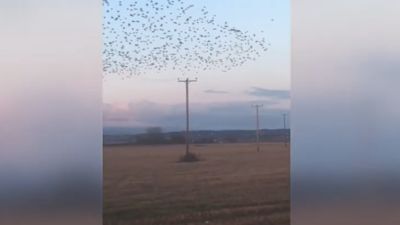Roosting starlings behind mysterious power cuts in Scottish village

Video report by ITV News Correspondent Martha Fairlie
The mystery over what has been causing power cuts in a small Scottish village has been solved thanks to the detective work of an engineer.
Electricity in approximately 50 homes in Airth, near Falkirk, cut off briefly over several evenings and SP Energy Networks were at a loss to explain it.
That is until lead district engineer Neil McDonald set out to investigate while on his way home and saw thousands of starlings unsettling the cables as they twisted and turned during their traditional winter 'murmurations'.
Mr McDonald, who captured the incredible sight on camera, said: "The sheer number of them caused the wires to bounce up and down as they danced on and off – there’s actually three wires between those poles and when they clash together, the power will go off for around 10 seconds or so at a time. That’s what’s been happening quite frequently, with some of these clashes causing wider damage and longer outages."
Experts say that murmurations, which form over the birds' communal roosting site, offer safety in numbers and protection from predators.
Toby Wilson, RSPB Scotland’s Senior Conservation Officer for Central Scotland said: "Starling murmurations are one of the great spectacles of the natural world and can be enjoyed across the UK during the autumn and winter months.
“Unfortunately, starling murmurations are becoming a rarer sight, as starling numbers have suffered serious declines over the past few decades due to loss of habit and changing farming techniques affecting food supplies."
SP Energy Networks now plan to work with the RSPB to find a way to discourage the birds from roosting near the power lines.
Methods to move starlings on normally involve playing loud artificial noise to put them off roosting in a specific location, including sounds of predators like sparrowhawks.
Mr Wilson added: "Obviously, we recognise the need to maintain energy networks and hope the birds can be sensitively encouraged to relocate to a suitable, nearby site."